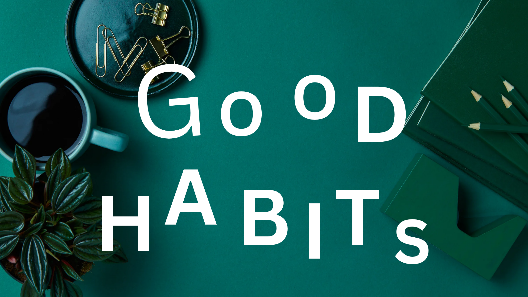9 min to read
Making good habits | Easy steps for big changes
Transform Your Daily Routine for a Happier You

Can you recall the phrase, ‘Small achievements create big differences’? Wait! Wait! Another one, ‘Rome wasn’t built in a day.’ There’s a reason I bring up these two famous lines as we dive into this article. Later, I’ll elaborate on the significance of these two phrases. During our childhood, we absorb numerous educational and motivational lines from our books. At that time, we may not fully grasp their significance. Yet, as we age and confront challenges in our journey to adulthood, these lines undergo a transformative impact on us. Let me keep it simple: ‘LOVE YOURSELF, TAKE CARE OF YOUR HEALTH AND MIND, AND DON’T RUSH; SUCCESS TAKES TIME TO GET READY.’ No more beating around the bush – let’s dive into the main topic. Ever wonder when people find inner peace and the confidence to achieve big things? For me, it’s when individuals build up good habits.
GOOD HABITS: WHAT ARE THESE WORDS ACTUALLY CONVEY?
In just one line for good habits- habits that generate dopamine inside you and bring happiness and success in your life. Can me and you just TRY to explain these within the words it contains?
- Gratitude – Appreciate every small positive aspect in your surroundings, and express thanks to people; you cannot imagine how a single smile from someone can brighten your day and provide the energy needed to finish pending tasks. Trust me, this habit has seemingly transformed my life, working wonders.
- Organization – I restart from scratch when it is time to organize my workspace, my schedule, and my every belonging. Being organized can rejuvenate your efficiency, and reduce stress.
- Openness – Always strive to open your mind, being honest and open-hearted to new ideas, perspectives, and experiences. This creates opportunities to engage in meaningful communication with diverse individuals. Avoid succumbing to jealousy when those around you make progress; instead, find joy in their happiness.
- Daily – Consistency stands as the greatest weapon for success in life. Regardless of the adjustments, positive attitudes, or actions you incorporate, take a few moments each day to reflect upon them.
- Healthiness – For me, I prioritize the primary and foremost prerequisites for forming good habits: your health is your power. Being healthy is the initial step towards success. Regular exercise and staying hydrated are essential. Have you ever used any applications to remind you to drink water? I did. I used to consume very little water, but now, with the assistance of that app, I have transformed my drinking habits. Adoptive – Prepare yourself for all kinds of challenges in life. I dislike complaining about things I didn’t receive; instead, I prefer adapting to every environment, seeking peace, and cultivating contentment within my mind.
- Balanced – Craft diet plans that nurture wealth within, steering clear of harm to our digestive system. Ensure a balance of nutrients and minerals. Additionally, prioritize a requisite amount of sleep, and don’t overlook the importance of rising early for a morning walk.

Cut the carb from your diet with replacement of fruits and nuts
- Investment – Invest your energy and actions in activities that bring benefits; refrain from wasting valuable time on backbiting and other negative pursuits.
- Time – The most significant challenge in establishing goals and assessing productivity is effectively managing your time. For time management, this is the best method you can apply time management
- Spread Happiness – Do you believe in spreading happiness? I certainly do; it makes a difference. Try spreading happiness, and you’ll witness the changes. It helps.

- One last thing - “Every day, try to lend a helping hand at least once. It could be as simple as picking up a pen from the floor if it hurts people on their way. Alternatively, why not compliment someone you encounter in your daily life? It could be the bus driver, the gatekeeper, the aunt in the canteen, the cashier at the supermarket who handles your bills, or anyone you come across. A sincere line like ‘You are looking so beautiful today’ can make a significant difference. I assure you, their innocent smiles will infuse you with energy to kick start your day.”
HOW THESE BIG CHANGES COME FROM?
“Big changes with good habits” refers embracing positivity (good habits) in your daily life create significance in the long run.
1.Gradual Advancement: Do you believe that establishing small goals with short deadlines leads to more spontaneous achievements? In my perspective, aiming for gradual transformation rather than radical changes is more effective. For instance, when it comes to New Year’s resolutions, having a 365-day timeframe often leads to a slower pace. On the contrary, setting up 15-30 day targets for significant changes might be more effective in maintaining focus and accomplishing the desired transformation.
2.Ginormous transformation: Just one good habit can initiate a catalyst for numerous good habits. The perfect example for this concept is morning walk. Morning walk can present the world and its natural surroundings with a different perspective. Without physical fitness, it can gift you with mental well-being, increased energy levels, better sleep patterns, mindfulness, better time management, a habit of setting daily goals, stress management, strengthened social connections.

Can you sense the profound positivity inherent in these morning moments with nature?
3.Mental and Physical balance: The ultimate goal is to enhance your overall well-being in the long run and achieving big in life lies on our physical and mental health. Good habits contribute greatly to physical health, mental and emotional balance.
HOW TO ACKNOWLEDGE THESE GOOD HABITS?
There are some ninja techniques for exploring these habits in our life.
- Motivation: Motivate yourself consistently by recognizing every instance of your accomplishments. Reflect on the reasons behind these achievements and identify the positive habits that contributed to their success. Embed these successful habits into your daily routine, reinforcing them regularly. Acknowledge the role of these habits in your accomplishments, creating a cycle of motivation and continuous improvement in your daily life.
- Visual Reminders: We are all familiar with how sticky notes assist us in remembering our habits and scheduled tasks. Writing specific notes, such as a friendly reminder for ourselves, expressions of appreciation for teachers, or memories that serve as visual cues, not only helps us recall important details but also serves as motivation. These reminders encourage us to engage in the cultivation of positive habits, exploring opportunities that lead to greater achievements in our lives.

- Learn from Challenges: Challenges serve as nourishment for continuous learning, fortifying oneself to achieve positive outcomes in life. Embracing these challenges, learning from them, and acknowledging them as preparation for future obstacles are integral components of the pathway to success. Recognizing the lessons within challenges empowers individuals to navigate future hurdles and contributes significantly to the strength required for success. Building up good habits is a beautiful journey of self-improvement. Celebrate the process and enjoy the positive transformations that come with cultivating good habits.
HINDRANCE TO BUILD UP THE GOOD HABITS:
- Procrastination: In my childhood, I procrastinated even when it came to learning the word “procrastination.” Do you get it? Procrastination means delaying your scheduled work. This habit can hinder personal and professional growth and effect our routine and the journey for acknowledging the good habits. So for building up the good habit, first we need to win over procrastination.
- Long Deadline & Big goals at once: Recall the New Year’s resolution we discussed earlier; it aligns with the core idea here. Rather than imposing lengthy deadlines for tasks, we can break down the work into smaller, manageable parts, celebrating each small finish line with enthusiasm. For example, if you want to develop a habit of exercising, start with a smaller goal, no need to hope for 10,000 steps on the first day. The key is to avoid dreaming solely of grand goals without laying the groundwork. Failing to initiate the basics often becomes the primary obstacle to the success of any project. And also “Rome wasn’t built in a day”.
HOW ABOUT LIGHTNG UP OUR IDEAS BASED ON SOME RRESEARCHES:
Let’s get a quick idea what researchers think about habit.
A neural link between affective understanding and interpersonal attraction - Raymond J. Dolan, Yannis Paloyelis, Geraint Rees
Investigates the neural mechanisms behind habit formation, particularly in the context of interpersonal attraction. The research explores how the brain links affective understanding (emotional understanding) and the development of habits in social relationships.
How habits are formed: Modelling habit formation in the real world - Benjamin Gardner, Rebecca Lally, Jane Wardle
The study explores the psychological factors that contribute to the development of habits and how habits are maintained over time.
Making health habitual: the psychology of ‘habit-formation’ and general practice - Phillippa Lally, Cornelia H. M. van Jaarsveld, Henry W. W. Potts, Jane Wardle
Explores the habit formation in the context of health behaviors and how long it takes for behaviors to become habitual and the factors influencing habit formation in a healthcare setting.
ATOMIC HABITS:
I would like to conclude this writing by incorporating words from one of my favorite books that I have not only reflected upon but also strive to continuously embody in my life.

“Atomic Habits” by James Clear it’s a popular self-help book that explores the idea of making small changes to create remarkable results and the science and psychology behind habit formation. The book is structured around four key principles: -Cue: Identify the trigger or cue that initiates a habit. -Craving: Develop a strong desire or craving for the rewards associated with the habit. -Response: Establish a specific and actionable response to the cue. -Reward: Ensure that the habit is rewarding, reinforcing its positive nature. The book delves into the power of tiny habits, how they compound over time, and how they can lead to significant personal and professional transformations. If you ever feel low and frustrated, I will recommend you to read this book, it will change the way of thinking.

